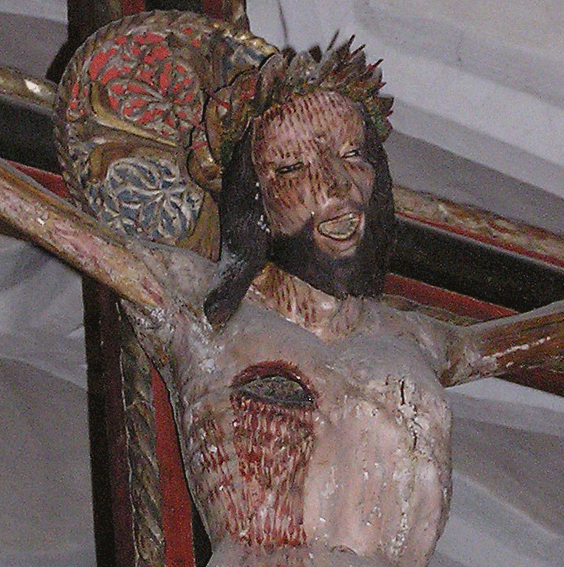the mystery of the crucifixion
And because of their saying: We slew the Messiah, Jesus son of Mary, Allah's messenger - they slew him not nor crucified him, but it appeared so unto them; and lo! those who disagree concerning it are in doubt thereof; they have no knowledge thereof save pursuit of a conjecture; they slew him not for certain.
Qur'an 4:157, trans Pickthal
This critical verse turned up today in Robert Spencer's series of blog entries that are working through the Koran from start to finish: Blogging the Qur’an: Sura 4, “Women,” verses 104-176. All the commentaries that Spencer refers to posit a substitute person who was made to appear like Jesus to fool the Jews into believing that He had indeed been crucified when in reality He had been whisked away into Heaven by Allah. These are purportedly orthodox or mainstream commentaries, not mystical or Sufi interpretations (which are often seen as heretical by orthodox Islam).
What did the Sufis think of this verse? And, in particular, how did Rumi see it? He does refer to this verse in his Ghazal (Ode) 728 which juxtaposes Jesus the Messiah with His Islamic counterpart, Mansur Al-Hallaj, who was also executed in part by crucifixion (though ultimately by beheading). Below is the Coleman Barks version of the ode in its entirety followed by the Arberry translation of the pertinent lines.
More Range
We're friends with one who kills us,
who gives us to the ocean waves. We
love this death. Only ignorance says,
Put it off a while, day after tomorrow.
Don't avoid the knife. This friend
only seems fierce, bringing your soul
more range, perching your falcon on a
cliff of the wind. Jesus on his cross,
Hallaj on his - those absurd killings
hold a secret. Cautious cynics know
what they're doing with every moment and why.
Submit to love without thinking, as
the sun this morning rose recklessly
extinguishing our star-candle minds.
Rumi: Ghazal (Ode) 728
version by Coleman Barks
That idea the Christian carries abroad, the Moslem has not that
idea, that He is slaying this Messiah upon the cross.
Every true lover is like Mansur, they slay themselves; show any
beside the lover who deliberately slays himself!
Rumi: from Ghazal (Ode) 728
translation A.J. Arberry
Rumi's interpretation jumps right outside of the obvious and literal and places the difference of opinion between the Christian and the Muslim right where it most appropriately sits: simply as a difference of perspective. The Christian sees the observer of the crucifixion as the agent thereof, whereas the Muslim (or strictly the Sufi Muslim) sees the victim, whether Jesus or Mansur, as a self-slayer, as a willing agent of His own self-sacrifice. It's no wonder Rumi was revered at his death as a great bridge-maker across religious divides for this is a subtle and profound interpretation that allows for a partial truth in both perspectives. Both the orthodox Christian and the orthodox Muslim have missed the point, he says. Neither has grasped the essential mystery of the crucifixion.
And yet ...
Rumi's is a rare and obscure interpretation and there is no evidence that it ever "took off" with enough convincing power to allow Christians and Muslims to live in peace in the region. Even today, in Rumi's area of the world (modern day Turkey), the tension between the two religions persists.
Moreover, Rumi's take is more radical even than the Christians' as it removes all agency and therefore all blame from the actual judge, jury and executioner that we would normally hold guilty for torturing and murdering an innocent victim, let alone a great prophet or saint.
If we carry such reasoning to its logical conclusion, then all 3000 victims on sep11 were self-slain. Perhaps it was not true for all, but at least for those who recognized as they died that they were necessary players in an awesome divine drama. I feel sure that many came to some such conclusion as they approached the final explosive impact, as they roasted in the intense heat inside the buildings, or as they plunged to their death outside.
Similar observations can be made regarding the Jewish victims of the holocaust, the Russian victims of Stalin, the Chinese victims of Mao, and the many many millions of others throughout history. As Rumi puts it in the Arberry translation: "show any beside the lover who deliberately slays himself!"
It is surely true that the West suffers from an excess of egotism but surely the radical mystic - as expressed by Rumi in this ode and by Jesus and Hallaj in the manner of their death - suffers from an excess of ego-denial. The smaller sun of the ego is born from the larger sun of the greater self: we are made in the image of God. As certainly as we return to dust at death, so does our smaller sun return home to the larger. However, between our birth and our death, surely we are responsible for taking care of this temporary vessel of the soul, our living bodies; surely we are responsible for maintaining our self-reliance (call it our free will) in the face of forces far beyond our control; surely we are responsible to keep our small individual candles alight even as God's ferocity whirls about us; and surely we are called upon - by Whom? - to stand up to God and say "no" to utter devastation.

Jesus on the Cross @ wikimedia



0 Comments:
Post a Comment
<< Home